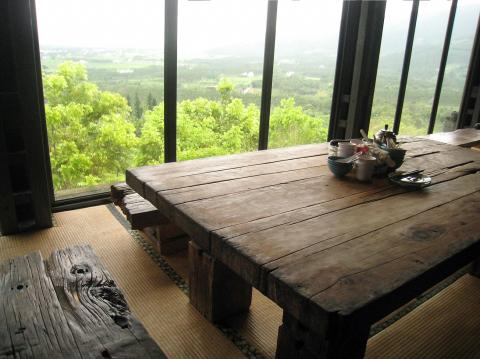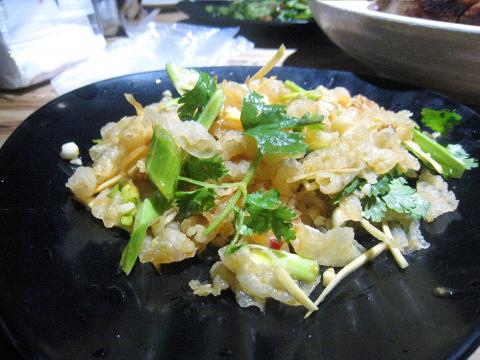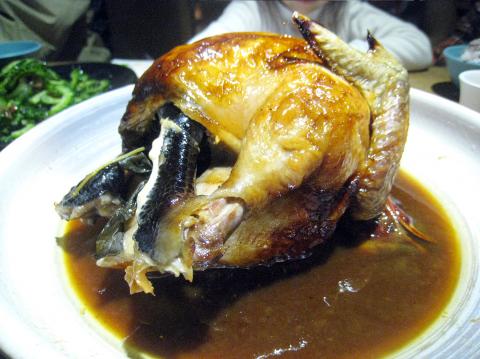Moon House is a rustic little complex perched up on the hillside over-looking the Huatung Rift Valley (花東縱谷) in Fenglin Township (鳳林鎮) in Hualien County. Over the years, it has acquired a reputation as a “must-visit” destination for visitors to Hualien, especially foodies, as its chicken in plum sauce (碳烤梅汁桶雞) has become something of a local classic. It was this very reputation as a tourist destination that had kept me away from Moon House, but after I did stop by for lunch, the restaurant immediately became a preferred choice for special meals.
True, there are usually too many people and the dining area can be noisy. Parking is horrendous, service is variable — ranging from quite good to quite annoyingly arrogant — and prices are a little on the high side. But the food is generally excellent, and when the weather is good, the atmosphere of its spacious courtyard and the views it affords over the valley are unparalleled.
The first impression of Moon House is that of a teahouse, designed specifically for visitors to relax and to take in the scenery in a mood of quiet contemplation. Stone seats, a comfortable balustrade against which to rest, a negligently casual arrangement around the fishpond and the occasional stray chicken wondering around all generate a mood of ease and relaxation. A small dining area directly overlooking the valley is generally booked out weeks in advance.

Photo: Ian Bartholomew, Taipei Times
Two larger dining areas branch off a central reception area. There is western-style seating as well as lower hawker stall type seating, all made of hardwood and placed on a floor of tatami matting. Remove the chairs and tables, and you could easily imagine coming to this place for a meditation retreat.
This ascetic first impression is quickly contradicted by the busy staff bringing plates of delicious-looking food to the table. The plating is not artful, but the signature dish — the chicken in plum sauce — is alluring with beads of succulent oil glistening against its slightly charred skin, and fruity and herbal aromas rising up from its plentiful gravy at the bottom of the serving bowl. This chicken comes with a pair of cotton workmen’s gloves and another pair of food service plastic gloves, both sets to be worn by the person deputed to tear this chicken apart and leave the dismembered carcass to steep momentarily in the sauce before digging in. The bird is priced according to provenance: A pure “local” chicken (土雞), often translated as free-range chicken, is NT$800, while a slightly less pure hybrid (仿土雞) is NT$550.
This chicken dish is best for a table of four or more, but such is its fame that I have seen tables of two manfully tackling it. Fortunately, Moon House has no objection to packing a doggy bag for leftovers.

Photo: Ian Bartholomew, Taipei Times
The chicken in plum sauce, while the establishment’s most famous dish, is far from being its only attraction. The food has a strong Hakka influence, and there are a number of specialties from this cuisine, including Hakka-style salted pork (客家鹹豬肉, NT$250 for a small serving) and Hakka stir fry (客家小炒, NT$220). The crunchy mountain pig skin (脆薄山豬皮, NT$200), served cold, is a good example of the labor-intensive preparation of unregarded ingredients to create something really delicious.
Even for dishes that are not part of Hakka cuisine, such as lion’s head meatballs (紅燒獅子頭, NT$380), the flavors are big and bold. In the case of these meat balls, those preferring the refined tastes of Jiangzhe cuisine might find Moon House’s version a little too rustic.
Moon House also does an outstanding selection of simple vegetable dishes, in many cases making clever use of local wild vegetables, adding an element of surprise to the flavor profile of well-known dishes. This is particularly pronounced with the soup of wild vegetables (野菜湯, NT$200), a mix of locally foraged vegetables often bitter in taste, but balanced well by a light stock and perfect for cutting through the heavy flavors of the meat dishes. Although the menu is not particularly large, it is well composed, with a good mix of the familiar and the unexpected. Even the most tediously predictable items, such as pineapple and shrimp (鳳梨蝦球, NT$200) are notable for the freshness of the ingredients and the willingness to let natural flavors shine through.

Photo: Ian Bartholomew, Taipei Times
Two set menus, perfectly suited to a table of eight to 12, are available for NT$3,500 to NT$4,000, which provide an excellent showcase of the establishment’s signature dishes.

In the March 9 edition of the Taipei Times a piece by Ninon Godefroy ran with the headine “The quiet, gentle rhythm of Taiwan.” It started with the line “Taiwan is a small, humble place. There is no Eiffel Tower, no pyramids — no singular attraction that draws the world’s attention.” I laughed out loud at that. This was out of no disrespect for the author or the piece, which made some interesting analogies and good points about how both Din Tai Fung’s and Taiwan Semiconductor Manufacturing Co’s (TSMC, 台積電) meticulous attention to detail and quality are not quite up to

April 21 to April 27 Hsieh Er’s (謝娥) political fortunes were rising fast after she got out of jail and joined the Chinese Nationalist Party (KMT) in December 1945. Not only did she hold key positions in various committees, she was elected the only woman on the Taipei City Council and headed to Nanjing in 1946 as the sole Taiwanese female representative to the National Constituent Assembly. With the support of first lady Soong May-ling (宋美齡), she started the Taipei Women’s Association and Taiwan Provincial Women’s Association, where she

Chinese Nationalist Party (KMT) Chairman Eric Chu (朱立倫) hatched a bold plan to charge forward and seize the initiative when he held a protest in front of the Taipei City Prosecutors’ Office. Though risky, because illegal, its success would help tackle at least six problems facing both himself and the KMT. What he did not see coming was Taipei Mayor Chiang Wan-an (將萬安) tripping him up out of the gate. In spite of Chu being the most consequential and successful KMT chairman since the early 2010s — arguably saving the party from financial ruin and restoring its electoral viability —

It is one of the more remarkable facts of Taiwan history that it was never occupied or claimed by any of the numerous kingdoms of southern China — Han or otherwise — that lay just across the water from it. None of their brilliant ministers ever discovered that Taiwan was a “core interest” of the state whose annexation was “inevitable.” As Paul Kua notes in an excellent monograph laying out how the Portuguese gave Taiwan the name “Formosa,” the first Europeans to express an interest in occupying Taiwan were the Spanish. Tonio Andrade in his seminal work, How Taiwan Became Chinese,